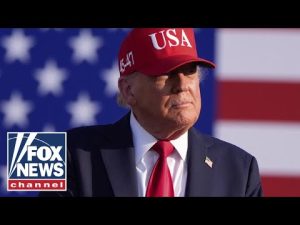Elon Musk has once again made headlines, but this time it’s not all Tesla and SpaceX. Instead, he’s been flexing his political muscle in a way that has drawn the attention—and the ire—of former President Donald Trump. Musk’s criticisms of the Biden administration’s electric vehicle (EV) mandate seem to stem from a mix of economic concerns and a desire for more freedom in the marketplace. This situation leads to an interesting examination of how wealthy entrepreneurs can influence governmental policies and the implications for the average American.
First, let’s look at Musk’s primary complaint. He argues that the current EV mandate imposes undue restrictions on the auto industry. While some might see this as a wealthy businessman lamenting a loss of profit, it’s worth considering Musk’s perspective—especially since his companies have made significant strides in clean energy. However, it’s important to remember that reliance on government regulations can create a slippery slope. One has to wonder if Musk is seeking an end to mandates because he believes in a free market or just wants to maintain his competitive edge.
Now, enter Donald Trump, who swiftly responded to Musk’s assertions. His assertion of authority—“I’m the president”—sends a clear message: despite Musk’s financial clout, political power ultimately rests in the hands of elected officials. Just because someone can tweet their opinions to millions doesn’t mean they get to dictate policy. In politics, there’s a delicate balance of power. The president’s remarks to Musk remind us that while entrepreneurial ventures can drive innovation, elected officials must keep the interests of all Americans in mind.
On the other hand, it’s hard to ignore that there may be some merit in Musk’s complaints about the proposed spending in the infrastructure bill. The conservative perspective is typically rooted in fiscal responsibility, which leads to questions surrounding government spending. It’s no secret that much of what passes through Capitol Hill boasts a price tag hefty enough to make anyone wince. While Musk’s concerns may resonate with some, they highlight a larger issue: the disconnect between political leaders and economic realities faced by everyday Americans.
But let’s pause for a moment and picture the larger implications. If Congress continues down its current path and ignores fiscal constraints, the ramifications could be dire. The thought of economic collapse looms, like a proverbial “fiscal cliff” waiting for an unsuspecting driver. Americans must ask themselves: is it worth pursuing ambitious projects at the expense of long-term financial stability? The answer is not as clear-cut as many would prefer, and that’s where voters have a responsibility to demand accountability.
Ultimately, the clash between Musk and Trump serves as a reminder that individuals, regardless of their wealth or influence, must navigate the complex world of American politics. The larger conversation should revolve around how America can maintain innovation while ensuring responsible governance. As the stakes grow higher with each passing year, both sides must work to find common ground. It’s a complicated dance, but at the end of the day, the focus should be on building a robust and sustainable future for all Americans—not just the Elon Musks of the world.







